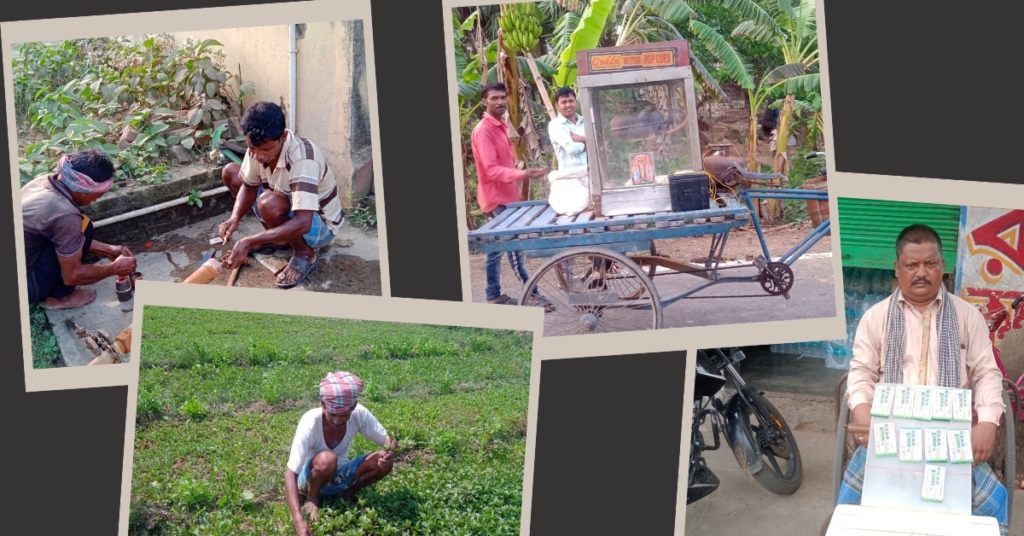
From popcorn sellers to plumbers, the Covid 19 Lockdown spared no one! Four men, all part of the informal economy, tell us how they are still struggling to make a living
11, Aug 2022 | Tinku Sheikh
The long-term impact of the Covid-19 induced nationwide Lockdown on peoples’ livelihoods, still persists across the country. Small business owners, migrant workers, farmers and many others employed in the informal economy, say that they are all still struggling to cope.
Here are the stories of four such men from Birbhum district of West Bengal – popcorn sellers and plumbers, Hindus and Muslims, able-bodied and disabled – they all have tales of woe, their economic struggles seemingly unending.
CJP’s Grassroots Fellowship Program is a unique initiative aiming to give voice and agency to the young, from among the communities with whom we work closely. These presently include migrant workers, Dalits, Adivasis and forest workers. CJP Fellows report on issues closest to their hearts and home, and are making impactful change every day. We hope to expand this to include far reaching ethnicities, diverse genders, Muslim artisans, sanitation workers and manual scavengers. Our raison d’etre is to dot India’s vast landscape with the committed human rights workers who carry in their hearts Constitutional values, to transform India into what our nation’s founders dreamt it to be. Please Donate Now to increase the band of CJP Grassroot Fellows.
Trilochan Mal:Popcorn sellerfrom Ninha
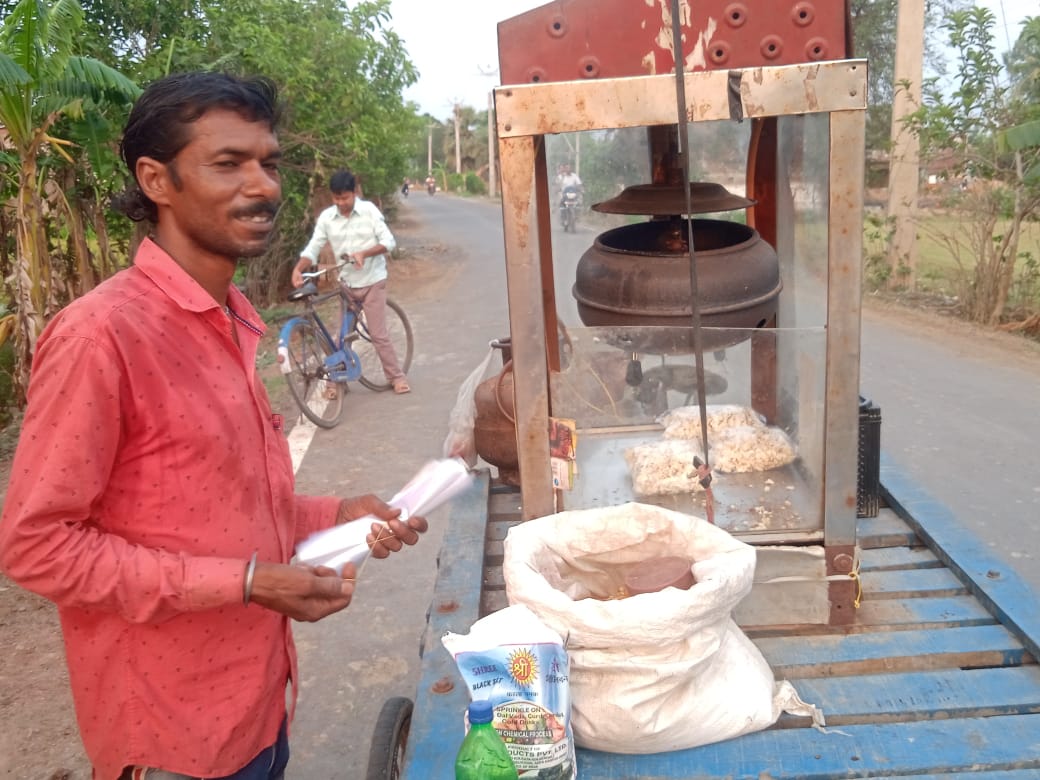
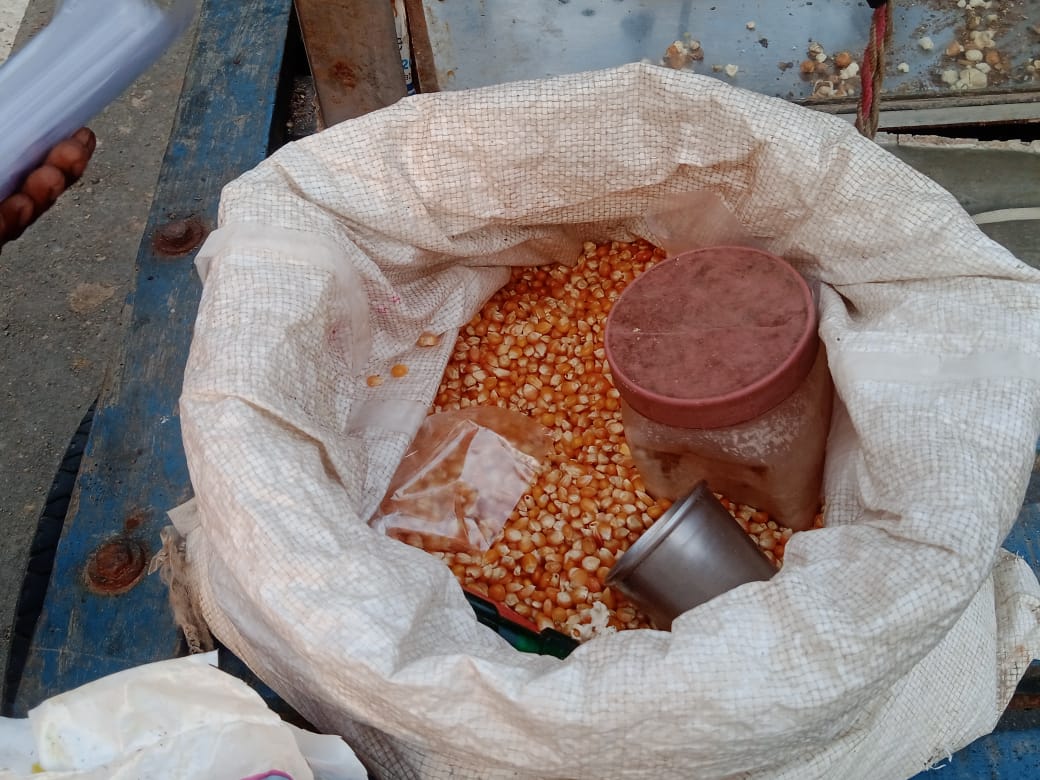
“When I was a child, I used to go to school. But when I turned 13, I started going to work with my father and I deeply felt his struggle during that time,” recalls 35-year-old Trilochan Mal, showcasing how his struggled began early in life. “When I turned 16, I started working as a brick kiln worker. I used to work there for five months a year, and the rest of the year, I used to manage with whatever work I could find,” he says shedding light on how his circumstances had been challenging even before the Covid-19 pandemic struck.
But he would still always find a way – some small sliver of hope to hang on to. “Soon I got married, I had three daughters. During the brick-kiln working months, my wife and I used to put our daughters to sleep, and leave our house at 10 P.Mafter putting the children to sleep, and return at 5 A.M. Then in the morning I used to go for work alone.”Mal and his wife sacrificed a lot during this period. “I struggled a lot, sent them to school, provided food, got one of the daughters married. But my days of struggle weren’t over. So, I thought about the future and decide on starting a business.”
In 2019, Trilochan Mal had started a business of buttered popcorn, but then the pandemic struck and everything came to a grinding halt. “I took a small loan and opened my popcorn stand. Soon after, the lockdown was announced, and everything was shut.” He says that this is how it is for small business owners. Some days they sell 250 rupees worth of goods, some days they make 400 rupees. But it’s a constant struggle to provide for his family, without any security.
“I know everyone has suffered but I don’t know how to translate our own sufferings in words. I’ve resumed my business now, and am continuing to try and provide for my daughters,” says Mal.
Badar Ali: Farmer from Ninha
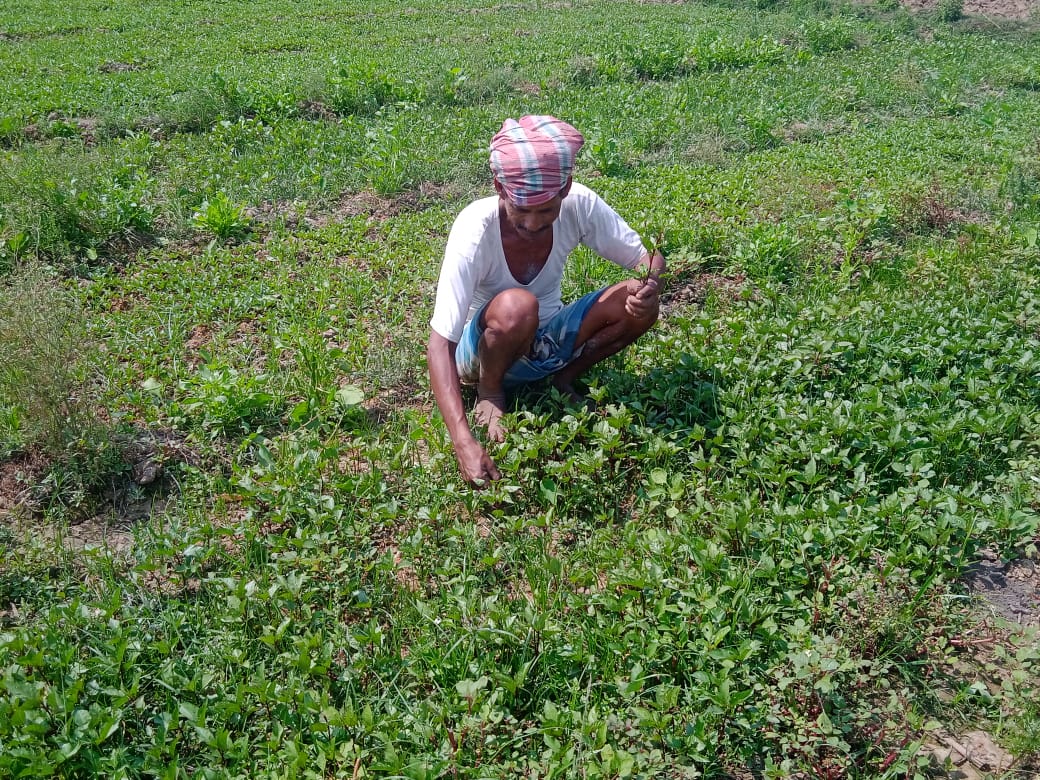
60-year-old Badar Alihas been engaging in back-breaking farm labour for more than 20 years. He works on his 7,200 square feet farm,rotating the crops between pumpkin, potatoes, onion, garlic and paddy. However, as this income is not sufficient to sustain his family of five, he also works on a paddy farm owned by somebody else.
But despite working twice as hard, his life as a farmer and farm worker is still replete with financial challenges. “The rising prices of fertilisers and manure have made it very difficult to eke out a living,” he says. One of his sons, who is a construction worker, is the only other earning member in the family.
Shortly after turning 60, Badar Ali applied for unemployment allowance, and after a lot of effort he managed to get a princely sum of Rs. 1,000 as his allowance.“Even that money doesn’t come every month. Besides, it isn’t enough to run a family of five,” he laments.
Azfar Ali and Rintu Sheikh: Plumbers from Birbhum district
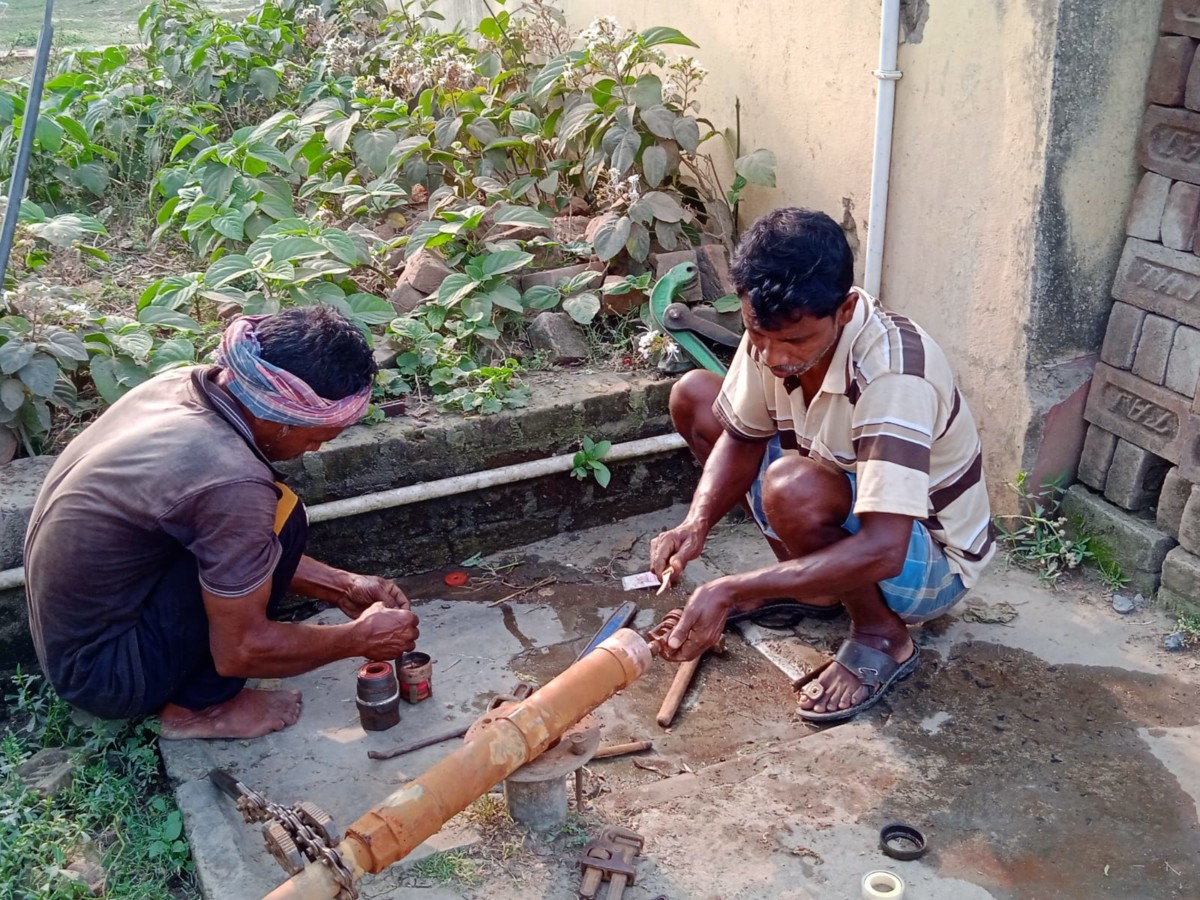
For the last 25 years, Azfar Ali and Rintu Sheikh have been working as plumbers for different contractors, travelling from one village to another on their bicycles. Till about four years ago, their work life was somewhat smooth, and the money they made was enough to sustain their families.
The challenge at that time though was how they would notice multiple sources of water which weren’t functional. “Even when we were brought this to the notice of the contractors, repair work could not be undertaken until the gram panchayats of the villages gave official permission,” they recalled.
During the Covid 19 lockdown, there was a major water crisis. “People from one place had to go to other areas to get water, and it was very difficult for them,” said Ali and Sheikh, whose work opportunities also dwindled during the pandemic. Even when they get calls from other villages, they are unable to go there and work because the contractors don’t assign work to them anymore.
“Eventually it depends on the villages, how quickly or efficiently they want the water systems to be repaired. Some villages take weeks to even address these problems,” they say.Both Ali and Sheikh are trying their best to work hard and provide for their families even though it has become very difficult to procure work.
Biswanath Bauri: Person with disability selling lottery tickets Rampurhat
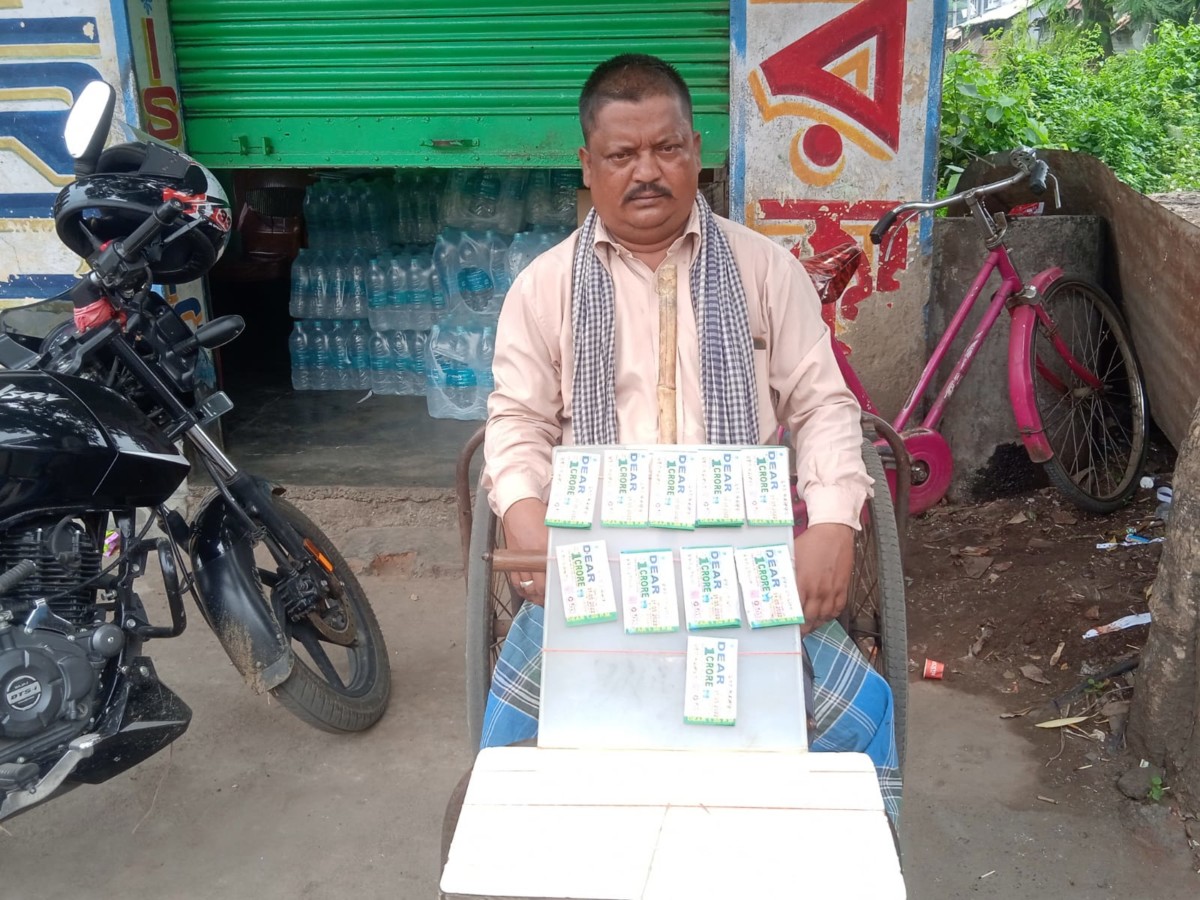
Biswanath Bauri is a 39-year-old from Rampurhat gaon in the Birbhum district of West Bengal. Bauri used to earn his living doing odd jobs when, in a cruel twist of fate, he met with an accident on May 5, 2010. He fell from a moving train at Mallarpur station in Birbhum district, losing both his legs. When he regained consciousness, he broke down inconsolably.
“Slowly, with time, the injuries on the operated legs healed, but I started worrying about the future. I had two daughters, ageing parents and a wife,” he says. He did get a compensation amount of Rs 2 lakhs from the government, which he spent on his elder daughter’s wedding. But he still had his younger daughter to worry about. “I started riding a special rickshaw suitable for me and started selling lottery tickets. Even though it was painful to ride those rickshaws regularly with both hands, I somehow persevered,” he says.
He would make the bare minimum,only about Rs 80 to 100, every day. He also receivedRs 1,000 a month as per one of the schemes for the disabled. “But during the Covid 19 lockdown, my business hit a further low. Whatever I was earning stopped, and I struggled to make ends meet,” he says, asking, “How can a person run an entire family with money from a reserved quota?”
“There’s no value for people like us,” laments Bauri, adding,“We are handicapped and thus deemed useless. If the government cared for us, they would help us out and give us ways to earn money for our families.”
After the Lockdown was lifted, he started to work again. “It’s much better to earn your bread and butter and fight for it, than to eat dal-chawal provided by the administration,” he says asking, “Besides, what does Rs 1,000 get you anyway? Does the government really care about us?”
Shedding light on his continuing struggle, he says, “I ride the special rickshaw everyday, and travel one to two kilometres to the Rampurhat hospital main gate, where I sell lottery tickets. It is a daily struggle and without my legs, it has become more difficult but people like us have to do exactly this to put food on the table.”
Related:
The eternal romance of traditional farming may soon be folklore










